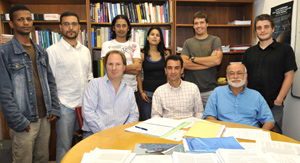NRF grant for modified gravity research
03 March 2008 |
| Spotlight on dark energy: (Front, from left): Prof Peter Dunsby, and Profs Salvatore Capozziello and Claudio Rubano, both of Naples University. (Back, from left) Julian Larena, Jannie Leach, Naureen Goheer, Kishore Ananda, Naureen Goheer, Sante Carloni, Mohamed Elshazli Sirelakhatim Abdelwahab. (Absent: Rituparno Goswami.) |
Professor Peter Dunsby and several members of UCT's Cosmology and Gravity Group (Department of Mathematics and Applied Mathematics) recently received two grants amounting to R1m from the National Research Foundation for the second three-year phase of a project to solve the dark energy conundrum.
The project results from a bilateral agreement between South Africa and Italy. Dunsby has been collaborating with professors Salvatore Capozziello and Claudio Rubano of Naples University, and a number of postdoctoral researchers (Sante Carloni, Kishore Ananda, Naureen Goheer, Rituparno Goswami and Julian Larena) to throw new light on dark energy by modifying Einstein's theory of general relativity.
Capozziello and Rubano were recent guests of the university.
Dark energy is one of the big questions perplexing cosmologists. The millennium reviews of the US National Research Councils and the UK's PPARC both ranked dark energy and dark matter top of their list of fundamental science questions for the new century.
Dark energy is not be confused with dark matter. Dark matter comprises about 25% of the matter of the universe. It doesn't emit or reflect enough electromagnetic radiation to be directly observed, though its presence is felt by its gravitational effects on galaxies and stars.
Dark energy is a hypothetical form of energy that fills space and acts in a way that increases the rate of expansion of the universe. Cosmologists use the existence of dark energy to explain recent observations that the universe appears to be expanding at an accelerating rate. In the standard model of cosmology, dark energy accounts for almost 70% of the total mass-energy of the universe.
Dunsby and his collaborators want to explain the elusive dark energy problem and cosmic acceleration by modifying Einstein's theory of relativity on cosmological scales rather than invoking a Cosmological Constant or exotic scalar fields.
"It's just possible that some of our most cherished ideas simply break down on these scales," says Dunsby.
"There's a long way to go," he concedes.
There is a lot of money being poured into observational facilities such as the South African Large Telescope, and South Africa stands a chance to win the Square Kilometre Array. Both these facilities will contribute to determining the cosmological parameters to very high acuracy. The challenge is to find a theoretical explanation that fits all the data.
While many theoretical physics research groups in the UK and US have suffered funding cuts, South Africa is ploughing resources into astronomy, excellent news for local research, Dunsby believes.
The South Africa/Italy collaboration has also been instrumental in training up young theoretical physicists. Two students, Jannie Leach (PhD) and Mohamed Elshazli Sirelakhatim Abdelwahab (MSc), will be submitting their theses in this area in the next couple of weeks.
 This work is licensed under a Creative Commons Attribution-NoDerivatives 4.0 International License.
This work is licensed under a Creative Commons Attribution-NoDerivatives 4.0 International License.
Please view the republishing articles page for more information.










